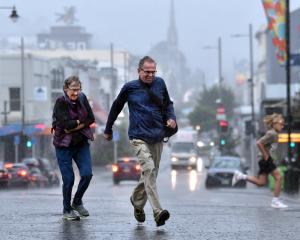The only way to change that future was to reduce land-use intensification, he said at the New Zealand FreshwaterSciences Society's conference in Dunedin yesterday.
"We have a freshwater crisis in New Zealand and we are slipping down the [international] rankings."
Reaction to his comments about the country's water crisis in international media led to Dr Joy introducing himself as "Dr Doom", "traitor", "egotist".
"I didn't sabotage New Zealand ... there is a huge amount of support for standing up for reality."
He said 68% of the country's ecosystems were threatened and, at that rate of decline, there would be no native fish by 2050.
Statistics like 90% of lowland rivers being unswimable, 43% of lakes polluted, and 90% of wetlands gone, backed up the argument, he said.
As did the fact dairy cow numbers had gone from 3.4 million to 6.2 million and had grown "sevenfold" in the South Island, irrigation had doubled, and nitrogen and fertiliser-use had increased heavily.
A study of environmental degradation in 179 countries showed New Zealand ranked 130th, he said.
"If that is not a crisis, then what would it take."
New Zealand had failed to address the major issue behind the crisis - land-use intensification which had led to a major decline in freshwater ecosystems, Dr Joy said.
Recent promotion of irrigation schemes was only going to increase it further.
"It's like leaky homes or Pike River. We've had 20 years of hands-off; the cause of the worst impact has been left alone.
As a result of not dealing with the cause, the country now faced an economic and environmental dilemma.
Environmental organisations needed to start monitoring the right components and they should be reported nationally, he said.
"We've got great science but what we've got to do is use it."
It was crucial that environmental indicators were measured properly so scientists could communicate to the community how their actions were impacting on freshwater.
"I think it could be a lot worse than we think."
As scientists, they had a "duty" to raise the issue, he said.
Hong Kong-based freshwater ecologist Prof David Dudgeon agreed.
"Don't give up. Even if we are beyond the limits, it may not be too late," the chair in ecology and biodiversity at the University of Hong Kong said.
The theme of the conference was "Beyond the Limits" and in answering that question, Dr Dudgeon said the world was already beyond the limit. An indication of this was the number of species on ICUN red-threat lists.
More data and monitoring was needed to track biodiversity changes and ensure river bio-diversity was included in water management.
"The more information the better but it is more important we apply what we already know."
Scientists could do better to advocate for freshwater if they wanted to protect waterways or roll back some of the degradation that had occurred, he said.
"We need to increase and raise public awareness of the importance of freshwater bio-diversity to human livelihood," Dr Dudgeon said.
Humans and fresh water mammals were competing for the same resource and some way needed to be found to reconcile humans needs with preserving biodiversity.
"Humans have solved their water supply problem but not the biodiversity problem."
About 240 people involved in freshwater science and management are attending the four-day conference at the University of Otago.














